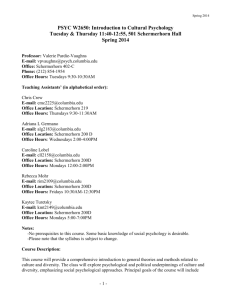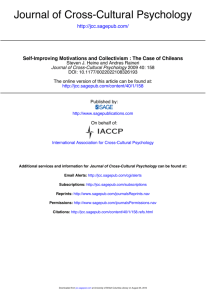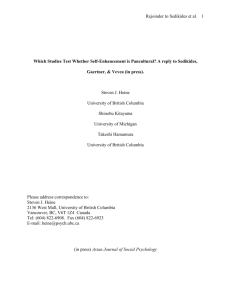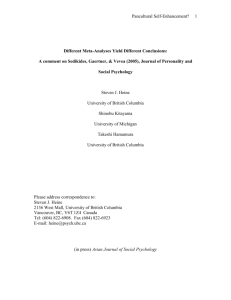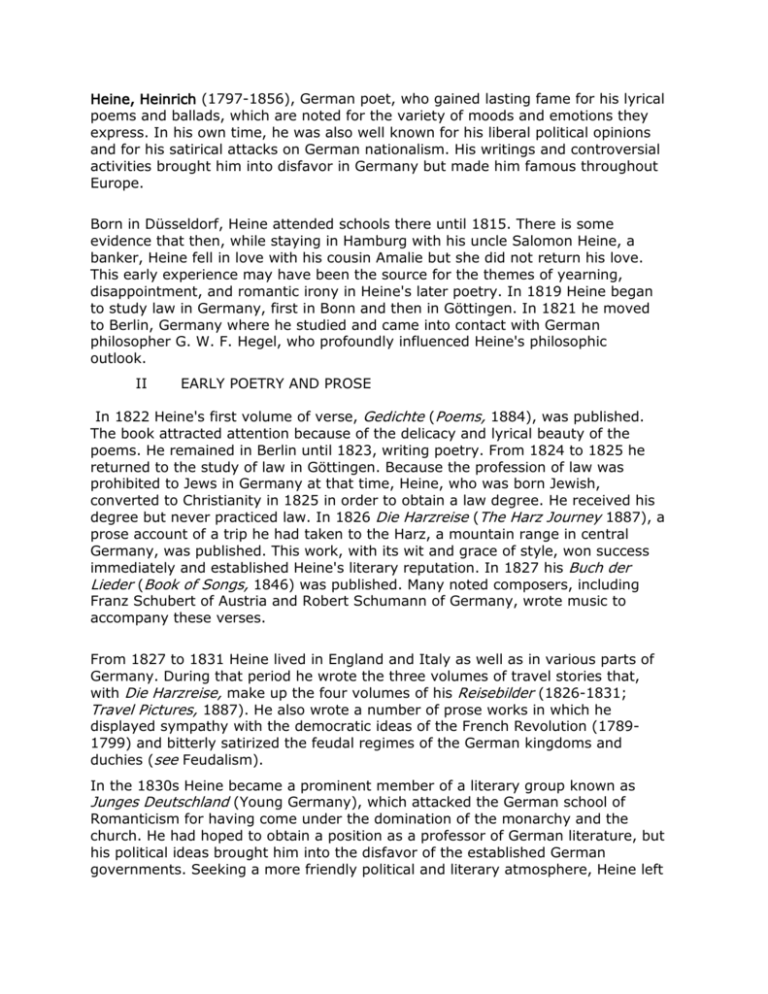
Heine, Heinrich (1797-1856), German poet, who gained lasting fame for his lyrical
poems and ballads, which are noted for the variety of moods and emotions they
express. In his own time, he was also well known for his liberal political opinions
and for his satirical attacks on German nationalism. His writings and controversial
activities brought him into disfavor in Germany but made him famous throughout
Europe.
Born in Düsseldorf, Heine attended schools there until 1815. There is some
evidence that then, while staying in Hamburg with his uncle Salomon Heine, a
banker, Heine fell in love with his cousin Amalie but she did not return his love.
This early experience may have been the source for the themes of yearning,
disappointment, and romantic irony in Heine's later poetry. In 1819 Heine began
to study law in Germany, first in Bonn and then in Göttingen. In 1821 he moved
to Berlin, Germany where he studied and came into contact with German
philosopher G. W. F. Hegel, who profoundly influenced Heine's philosophic
outlook.
II
EARLY POETRY AND PROSE
In 1822 Heine's first volume of verse, Gedichte (Poems, 1884), was published.
The book attracted attention because of the delicacy and lyrical beauty of the
poems. He remained in Berlin until 1823, writing poetry. From 1824 to 1825 he
returned to the study of law in Göttingen. Because the profession of law was
prohibited to Jews in Germany at that time, Heine, who was born Jewish,
converted to Christianity in 1825 in order to obtain a law degree. He received his
degree but never practiced law. In 1826 Die Harzreise (The Harz Journey 1887), a
prose account of a trip he had taken to the Harz, a mountain range in central
Germany, was published. This work, with its wit and grace of style, won success
immediately and established Heine's literary reputation. In 1827 his Buch der
Lieder (Book of Songs, 1846) was published. Many noted composers, including
Franz Schubert of Austria and Robert Schumann of Germany, wrote music to
accompany these verses.
From 1827 to 1831 Heine lived in England and Italy as well as in various parts of
Germany. During that period he wrote the three volumes of travel stories that,
with Die Harzreise, make up the four volumes of his Reisebilder (1826-1831;
Travel Pictures, 1887). He also wrote a number of prose works in which he
displayed sympathy with the democratic ideas of the French Revolution (17891799) and bitterly satirized the feudal regimes of the German kingdoms and
duchies (see Feudalism).
In the 1830s Heine became a prominent member of a literary group known as
Junges Deutschland (Young Germany), which attacked the German school of
Romanticism for having come under the domination of the monarchy and the
church. He had hoped to obtain a position as a professor of German literature, but
his political ideas brought him into the disfavor of the established German
governments. Seeking a more friendly political and literary atmosphere, Heine left
for Paris in 1831. Except for two brief visits to his native land, he spent the rest of
his life in France.
III
FINAL WORKS
In Paris Heine wrote for several German newspapers and became friends with
writers such as Honoré de Balzac and George Sand and composers such as Hector
Berlioz and Frédéric Chopin. In 1835 the writings of the Junges Deutschland group
were banned in most of Germany, and Heine's income was considerably reduced.
In 1845 he contracted a spinal disease that confined him to his “mattress grave,”
as he called his bed, from 1848 to his death in 1856. Nevertheless, some of his
most notable works such as the volume of poetry Romanzero (1851), date from
the last years of his life.1
1"Heine, Heinrich."Microsoft® Encarta® Encyclopedia 2001. © 1993-2000 Microsoft
Corporation. All rights reserved.


